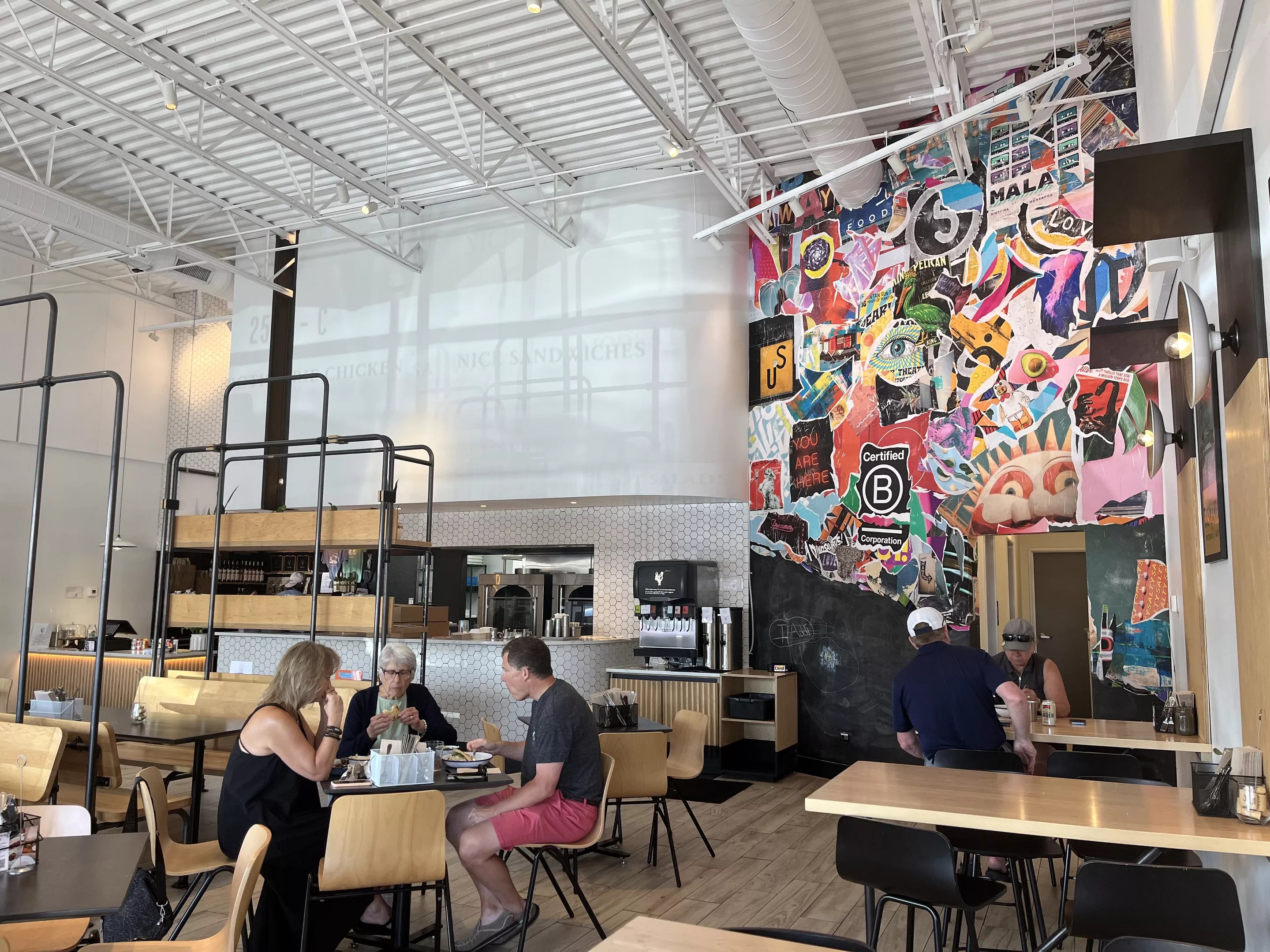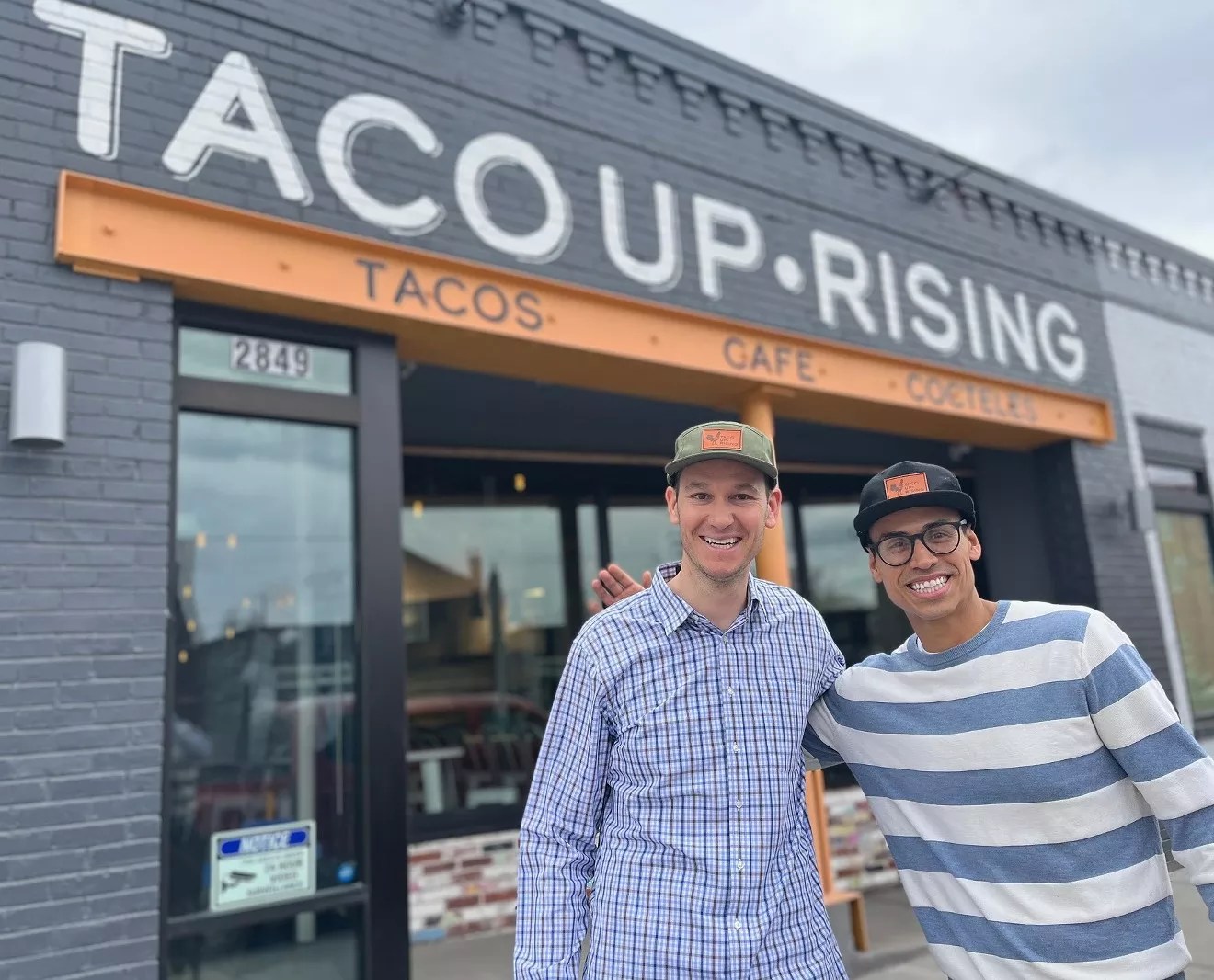
Kristin Pazulski

Audio By Carbonatix
When you walk into the Chook Chicken location at 4340 East eighth Avenue, there is a color-splashed wall of images with a black-and-white “B” in a circle in the middle.
The symbol is one the brand has worked hard for. It’s a certification that designates it as part of a “network transforming the global economy to benefit all people, communities, and the planet” – B Lab‘s description of the 7,759 companies around the world that have earned the B Corp certification by meeting certain humane and sustainable standards.
Well-known B Corp certified brands include Patagonia, Ben & Jerry’s and Bombas, but the distinction is rare for a restaurant. Chook is one of only about eighty food- or beverage-related companies in the world to have one.
“B Corp Certification is a designation that a business is meeting high standards of verified performance, accountability and transparency on factors from employee benefits and charitable giving to supply chain practices and input materials,” according to B Lab’s website. “B Corp Certification is holistic, not exclusively focused on a single social or environmental issue. And the process to achieve and maintain certification is rigorous and requires engaging teams and departments across your company.”
Terms and phrases surrounding sustainability – such as “compostable,” “bio-degradable,” “fair trade” and “organic” – are often just unverified, market-aimed buzzwords.
The B Corp Certification, however, is not a simple stamp of approval for companies that can afford it – though it does cost money. The assessment is rigorous; certification requires hours of research, collecting paperwork and implementing practices that reflect sustainable and caring business operations.
Businesses are awarded points based on practices in five areas: governance, workers, community, environment and customers. To receive certification, a business has to score a minimum of eighty points. Each practice is weighted. For example, having all certification standard policies in the employee handbook can earn a business .33 points; monitoring energy use can earn .97 points; and monitoring waste production earns up to 1.3 points.
There are fewer than thirty restaurants in the country that have a B Corp certification, and Chook, which was founded in 2018 and now has three metro-area locations, is the only one in Colorado. Getting those eighty points can be harder for restaurants because the certification’s point-earning practices apply to businesses that span industries, from warehouses, factories and offices to art studios, construction sites and farms.
Creating a list of standards that can apply to most businesses is no easy task. “It’s amazing that the certification applies to businesses across industries all around the world,” says Chook CEO Elizabeth Nicholson. “It’s a rare assessment.”
But because of this, some of the practices don’t apply to restaurants, and others, like limiting landfill waste, are more difficult. Getting the B Corp Certification would require a lot of policy changes for most existing restaurants, Nicholson notes, adding that it’s easier to tackle the requirements as a restaurant launches.

Taco Uprising owners Matias Gutknecht (left) and Samuel Valdez.
Kristin Pazulski
Matias Gutknecht knows that firsthand. He opened Taco Uprising in Five Points this summer with co-owner Sam Valdez. As plans for the restaurant moved forward, Gutknecht studied the B Corp guidelines, and from day one, the taco joint has incorporated practices that meet the certification standards, though it is still working toward officially becoming certified. “This is what we believe with every fiber of our being, and the certification is a way to cement that,” says Gutknecht. “But it’s a significant investment. Doing it during setup, it’s easier to tailor operations to build the tools to successfully execute what’s needed for the certification.”
Another reason for a lack of certified restaurants is the current return on investment. The B Corp certification is expensive ($2,000 to $8,000), but it is not yet well-known enough to make it worthwhile as a marketing tool. In addition to the hours of preparation the application requires, it can take years to officially get the certification. Gutknecht says he can’t even estimate how much time he’s spent on the process. “You really need to want to do it,” he notes.
Corey Clark, governance co-chair for the local network of B Corp certified businesses, B Local Colorado, and senior sustainability manager at Honeycomb Strategies, acknowledges that the B Corp certification can be a labor of love. “A business, particularly a restaurant, may not see the value for its consumers unless [those consumers] are living the ethos already,” she says.
“Owners and operators of restaurants are wearing so many hats,” adds Nicholson. “I’m not sure they have the bandwidth to do it.” She notes that the B Corp Certification overall needs to be better marketed, but at Chook, customers have taken note of the restaurant’s sustainability efforts. When the restaurant had to temporarily move to recyclable instead of compostable to-go containers, for example, customers were vocal about the change.
Both Chook and Taco Uprising believe that their efforts could help the B Corp message grow. Plus, Nicholson adds, employees who leave Chook carry the knowledge of sustainable practices with them into other restaurants, where those ideas can be implemented whether those businesses go for the full certification or not.
“There’s so much training that goes into it,” says Gutknecht. “This is an industry that needs to be revamped, and we’re hoping to show how that’s possible.”